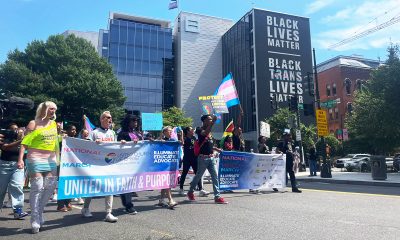National
Gays referenced in benediction, inaugural poem
Gay poet sounds theme of unity; pro-LGBT minister mentions gays in benediction
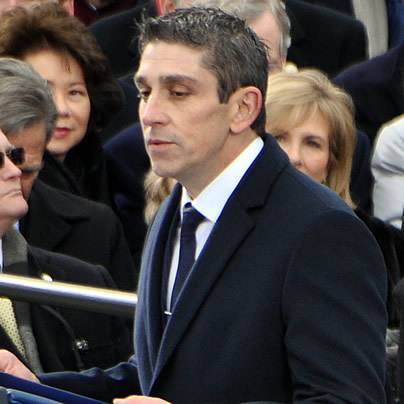
Toward the close of President Obama’s inaugural ceremony, nationally acclaimed poet Richard Blanco, who is gay, read a poem that sounded the themes of American unity and equality. Although his poem didn’t mention LGBT people directly, he made repeated references to inclusiveness and oneness, saying at one point that Americans are “arrayed like rainbows.”
Minutes later, Rev. Dr. Luis Leon, pastor of D.C.’s St. John’s Episcopal Church at Lafayette Square, mentioned gays in his benediction or closing prayer at the inaugural ceremony.
http://www.youtube.com/watch?feature=player_embedded&v=C4ySjY3uNsU#!
“With your blessing, we will see that we are created in your image,” he said, referring to God, “whether brown, black or white, male or female, first generation immigrant American or daughter of the American revolution, gay or straight, rich or poor.”
Leon served on an interfaith group of local clergy that campaigned for D.C.’s same-sex marriage law in 2009. He was selected by the presidential inaugural committee to deliver the benediction after another minister withdrew from that role. Georgia pastor Louie Giglio, who was initially selected to give the benediction, dropped out after news surfaced that he expressed anti-gay views in the 1990s.
Both Blanco and Leon are Cuban Americans whose families fled Fidel Castro’s Cuba to start new lives in the U.S.
Full text of the poem below:
One Today
One sun rose on us today, kindled over our shores,
peeking over the Smokies, greeting the faces
of the Great Lakes, spreading a simple truth
across the Great Plains, then charging across the Rockies.
One light, waking up rooftops, under each one, a story
told by our silent gestures moving behind windows.My face, your face, millions of faces in morning’s mirrors,
each one yawning to life, crescendoing into our day:
pencil-yellow school buses, the rhythm of traffic lights,
fruit stands: apples, limes, and oranges arrayed like rainbows
begging our praise. Silver trucks heavy with oil or paper—
bricks or milk, teeming over highways alongside us,
on our way to clean tables, read ledgers, or save lives—
to teach geometry, or ring-up groceries as my mother did
for twenty years, so I could write this poem.All of us as vital as the one light we move through,
the same light on blackboards with lessons for the day:
equations to solve, history to question, or atoms imagined,
the “I have a dream” we keep dreaming,
or the impossible vocabulary of sorrow that won’t explain
the empty desks of twenty children marked absent
today, and forever. Many prayers, but one light
breathing color into stained glass windows,
life into the faces of bronze statues, warmth
onto the steps of our museums and park benches
as mothers watch children slide into the day.One ground. Our ground, rooting us to every stalk
of corn, every head of wheat sown by sweat
and hands, hands gleaning coal or planting windmills
in deserts and hilltops that keep us warm, hands
digging trenches, routing pipes and cables, hands
as worn as my father’s cutting sugarcane
so my brother and I could have books and shoes.The dust of farms and deserts, cities and plains
mingled by one wind—our breath. Breathe. Hear it
through the day’s gorgeous din of honking cabs,
buses launching down avenues, the symphony
of footsteps, guitars, and screeching subways,
the unexpected song bird on your clothes line.Hear: squeaky playground swings, trains whistling,
or whispers across café tables, Hear: the doors we open
for each other all day, saying: hello, shalom,
buon giorno, howdy, namaste, or buenos días
in the language my mother taught me—in every language
spoken into one wind carrying our lives
without prejudice, as these words break from my lips.One sky: since the Appalachians and Sierras claimed
their majesty, and the Mississippi and Colorado worked
their way to the sea. Thank the work of our hands:
weaving steel into bridges, finishing one more report
for the boss on time, stitching another wound
or uniform, the first brush stroke on a portrait,
or the last floor on the Freedom Tower
jutting into a sky that yields to our resilience.One sky, toward which we sometimes lift our eyes
tired from work: some days guessing at the weather
of our lives, some days giving thanks for a love
that loves you back, sometimes praising a mother
who knew how to give, or forgiving a father
who couldn’t give what you wanted.We head home: through the gloss of rain or weight
of snow, or the plum blush of dusk, but always—home,
always under one sky, our sky. And always one moon
like a silent drum tapping on every rooftop
and every window, of one country—all of us—
facing the stars
hope—a new constellation
waiting for us to map it,
waiting for us to name it—together
For more on the festivities and ceremonies, visit our inauguration hub.
Health
The harsh truth about HIV phobia in gay dating
HIV and stigma remain baked into queer dating culture

Uncloseted Media published this article on Dec. 9.
This story was produced with the support of MISTR, a telehealth platform offering free online access to PrEP, DoxyPEP, STI testing, Hepatitis C testing and treatment and long-term HIV care across the U.S. MISTR did not have any editorial input into the content of this story.
By SAM DONNDELINGER | In his room, 19-year-old Cody Nester toggles between Grindr profiles on his phone.
As he senses chemistry with a match, he knows he has to flag something that could be a deal breaker.
“Did you see on my profile that I’m HIV positive?” he writes.
The reply arrives instantly.
“You’re disgusting. I don’t know why you’re on here.” Seconds later, the profile disappears, suggesting Nester is blocked.
“He went out of his way to say that. People could at least be more aware, ask questions, and understand the reality [of living with HIV] instead of attacking us,” Nester told Uncloseted Media.
“I would say 95 percent of people respond that way,” says Nester, who lives in Hollywood, Fla., and works at a Mexican restaurant. “The entire conversation is going fine. They’re down to meet up and then right when I mention [HIV], it’s always, ‘Oh no, never mind.’”
Some other messages he’s received include:
“You’ll never get anything in your life.”
“Why don’t you die?”
“Why are you on here?”
More often, it’s silence, a cold “No” or a sudden block.
“It’s like you’re a white fish in a school of black fish,” he says. “You’re immediately the odd one out.”
Even though Nester’s undetectable status makes it impossible for him to transmit HIV to partners during sex, he experiences stigma around HIV, something which nearly 90 percent of Americans agree still exists, according to a 2022 GLAAD report. And a survey shared in 2019 found that 64 percent of respondents would feel uncomfortable having sex with someone living with HIV, even on effective treatment. The emotional cost of this stigma is a significant barrier to intimacy and can result in a loss of self-esteem, fear of disclosure and suicidal thoughts.
What the science says — and why it doesn’t seem to matter
“The fear comes from antiquated ideas around HIV,” says Xavier A. Erguera, senior clinical research coordinator at University of California, San Francisco,’s Division of HIV, Infectious Diseases & Global Medicine. “A lot of people who are newly diagnosed still fear it’s a death sentence. Even though we have medications now to treat it effectively, and it’s basically a chronic condition, people haven’t caught up.”
Since 1996, antiretroviral therapies have developed to where they can suppress the virus to levels so low that it is undetectable in the blood, and thus not able to be transmitted to sexual partners. This is known as Undetectable = Untransmittable, or U=U. According to a Centers for Disease Control and Prevention report from 2024, 65 percent of HIV-positive cases are virally suppressed.
Another line of defense is pre-exposure prophylaxis (PrEP), which reduces the risk of acquiring HIV from sexual intercourse by roughly 99 percent when taken as prescribed. Approved by the Food and Drug Administration in 2012, the medication launched as a once-a-day pill and was hailed as a breakthrough as it transformed the sex lives of gay men, which had been shaped by decades of fear about HIV complications and about where AIDS came from.
“Internal logic doesn’t reflect what we know scientifically,” says Kim Koester, associate professor in the Department of Medicine at UCSF. “I was very optimistic when PrEP came out. The drug works, so why wouldn’t everyone use it?”
Even with PrEP use on the rise, less than 600,000 Americans used it in 2024, and Koester says skepticism and judgments about taking the drug persist.
“The phobia is pervasive,” Koester told Uncloseted Media. “People believe that others get the disease because of their lifestyle. … PrEP was supposed to be the antidote to the threat of HIV, reduce the anxiety, and make you more open to who you are and the sex you want. It’s supposed to be liberating. It is part of the answer. But it’s not enough. We don’t have enough people using PrEP for it to make the dent in the stigma we need.”
According to a 2023 study of seven informants living with HIV, public stigma stems from problematic views from society that those living with HIV are “a dangerous transmission source,” “disgraceful” and “violators of social and religious norms who have committed deviant behavior.”
Laramie Smith, assistant professor of Global Public Health at the University of California, San Diego, says this stigma is unwarranted and fueled by misunderstanding:
“With today’s treatments, it shouldn’t be a life-altering identity shift. It should be no different than, ‘I have diabetes.’ If you’re virally suppressed, it shouldn’t matter whether you’re friends with someone, whether you’re sleeping with someone — the science shows us that.”
How HIV phobia shows up online
Nester, who contracted HIV last year from a Grindr hook-up who insisted he was negative, says he is just starting to accept his diagnosis. “I didn’t go back on the apps for a long time after that. It messed with my mental health … realizing I’d have to take medication for the rest of my life.”
Since he started dating again this year, returning to apps like Grindr and Sniffies, he has faced a new normal. He tries to do everything “right” and disclose his status early. Even on his Grindr profile, he identifies as “poz,” slang for HIV-positive.
Still, he says most people ghost him once they find out. “The second I bring it up, it’s ‘No,’” says Nester. “The amount of discrimination you get … it’s always the same pattern. … People don’t know, and they don’t want to know. It messes with you.”
This discrimination may be fueled by a deprioritization of HIV awareness programs across the country. Earlier this month, the U.S. State Department did not commemorate World AIDS Day for the first time in 37 years. HIV prevention programs have been slashed, especially in conservative districts, and only 25 states and D.C. require both HIV and sex education. In many states, health curricula often lag behind current science and omit teaching about PrEP, gay sex and concepts like U=U. Research shows that Gen Z is currently the least educated generation about HIV.
“I could go all day explaining HIV, but people don’t want to listen,” says Nester, who is part of Gen Z. “People don’t want to learn about it; they just want to avoid it.”
HIV anxiety and public stigma shaped by history
Even in more progressive areas, stigma still exists. Damian Jack, a 45-year-old from Brooklyn, remembers sitting in an exam room in 2009 as a doctor explained how low his T-cell count was, which is a hallmark of HIV infection.
“I started hysterically crying,” he told Uncloseted Media. “HIV meant death. That’s what I thought.”
In 1981, when Jack was 1 year old, the first reports of a mysterious and deadly immune deficiency syndrome, which would later be named AIDS, appeared in the U.S. Growing up, Jack saw countless terrifying images of men on their deathbeds with Kaposi sarcoma, the purple lesions the media once called “gay cancer.” Public misinformation and fearmongering spread ideas that AIDS was a disease that “only gay men and drug users get.” And politicians often equated it with homosexuality and moral failure, calling it a “gay plague.” It wasn’t until September 1985, four years after the crisis began and thousands had died, that President Ronald Reagan first publicly mentioned AIDS.
Decades later, the emotional residue of that era and the shame associated with the virus lingers.
Hours after learning of his diagnosis, Jack faced his first encounter with rejection. He already had a date planned that night, and his doctor and friends encouraged him to go.
They had a great time until the date asked him: “Are you negative or positive?”
He told the truth.
“It was just understood there wouldn’t be a second date,” says Jack. “I remember thinking, ‘This is how dating is going to be now.’ I felt so anxious telling guys. It followed me everywhere. I don’t think that anxiety ever truly goes away.”
The emotional impact of HIV stigma
For those who are HIV-negative, experts say that “stigma’s whole design is to ‘other.’”
“The ‘us versus them’ creates that false sense of safety when it comes to HIV,” says Smith. “If I can believe that someone did something to deserve their diagnosis, and I’m not that [kind of person], then I’m safe.”
This othering is painful and can lead to shame, fear and isolation, and it is linked to a higher risk of depression and anxiety.
“If I’m undesirable, and that’s what those messages are communicating, that threatens your sense of safety, your sense of belonging and the fundamental desire we all have to be loved,” Smith says. “And that starts to reinforce the thinking that ‘I am not worthy. This virus that I have means that I’m not lovable. I am not safe showing up among other men.’”
“I pretend it doesn’t hurt, but some things do sting a little bit,” Nester says. “You start thinking, ‘Am I really that disgusting? Am I really that singled out?’”
When public stigma turns inward
“Internalized stigma is what occurs when applying the stereotypes about who gets HIV, the prejudice, the negative feelings, onto yourself,” says Smith.
In 2024, 38 percent of people living with HIV reported internalized stigma. And studies show that it can predict hopelessness and lower quality of life, even when people are engaged in care or virally suppressed.
Internalized stigma can also affect how people practice safe sex and communicate about the virus. A 2019 survey of men who have sex with men found that individuals who perceived greater community-level stigma were less likely to be aware of — and use — safer-sex functions available on dating apps, such as HIV-status disclosure fields, as well as sexual health information and resources.
“[HIV phobia] is probably the most intense, subvert bigotry I think you could experience,” Joseph Monroe Jr., a 48-year-old living in the Bronx, told Uncloseted Media.
On dating apps, men have messaged him things like, “You look like you’ve got that thing” and “Go ahead and infect someone else.”
Monroe has also dealt with misinformed people who rudely opine about how he contracted the virus: “Who fucked you? That’s how you got it, right?” people will say to him.
“You end up internalizing all these stereotypes about who gets HIV — that you were promiscuous, that you didn’t care about yourself, that you did something wrong,” says Smith. “You carry that in, and then you have to relearn: ‘No, I didn’t. This is just a health condition.’”
What HIV acceptance looks like and raising awareness
For those living with HIV, acceptance feels far away.
“You’re living under this threat of HIV and the threat that others find you threatening. It inhabits you socially and sexually,” Koester says. “People are hunkering down. Not putting themselves out there and having a mediocre quality of life. To have a sense of empowerment, you have to be legitimate and seen in the world and it’s hard to do that with the stigma that exists.”
Researchers say the path forward lies as much in conversation as in medicine.
Koester says she talks about HIV and PrEP anywhere she can, including in salons, cafes and restaurants. “Whenever I get into a cab with someone, I’m going to bring up HIV so the driver gets accustomed to hearing about it. … We have a long way to go in terms of exposure and awareness and every little bit helps.”
Part of this lies in increasing awareness through targeted marketing campaigns. PrEP is still profoundly misunderstood outside major urban centers, with uneven uptake among minority groups and usage gaps in the Bible Belt. And a 2022 U.S. survey found that 54.5 percent of people living with HIV didn’t know what U=U meant, and less than half of Americans agree that people living with HIV who are on proper medications cannot transmit the virus.
While eradicating stigma is slow, there is hope for acceptance.
Years after Jack’s diagnosis, in 2021, he told a man he was on a third date with that he was HIV-positive but undetectable. His date’s reply was almost casual:
“Oh — is that it? I thought you were going to say you had a boyfriend or something. I’m on PrEP. You’re fine.”
“It felt so good to hear him say that and accept me,” says Jack. “I was like, ‘This is my person. You’re my person.’” One year later, they got married.
Back in Florida, 19-year-old Cody Nester isn’t feeling this acceptance. He still scrolls past profiles that read “Only negative guys” and tries to ignore the hateful messages.
“It still hurts, but I know it’s coming from fear,” he says. “I wasn’t too informed about HIV before I got it. … When I got it, I really jumped into the rabbit hole and began to learn. I really do think [HIV and stigma] is because people are not knowledgeable. … When people don’t know details, they tend to get scared.”
Additional reporting by Nandika Chatterjee.
The White House
Trump’s shocking East Wing amputation—and the painful fallout Americans won’t ignore
Gay Social Secretary Jeremy Bernard talks about importance of civility
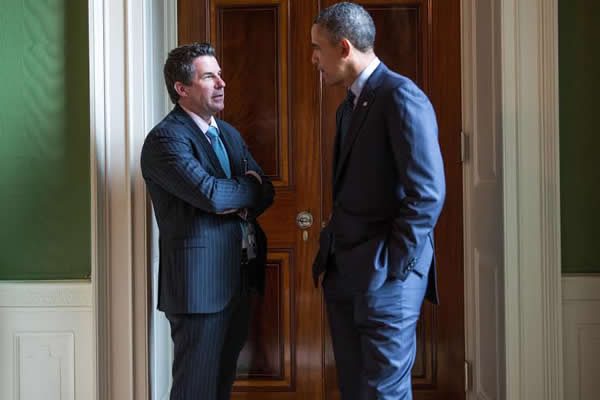
Since Jan. 20, 2025, life in Donald Trump’s divided America has been a series of jaw-dropping split-screen scenarios, flashing at an even faster pace since the resounding anti-Trump, pro-affordability Democratic electoral victories on Nov. 4. But while the weeks before Thanksgiving have injected hope that the No Kings marches, the rule of law, and the 2026 midterms will uphold democracy, Trump’s violently oriented MAGA and Christian National base and his committed Project 2025 backers continue remaking the federal government and fighting the culture wars.
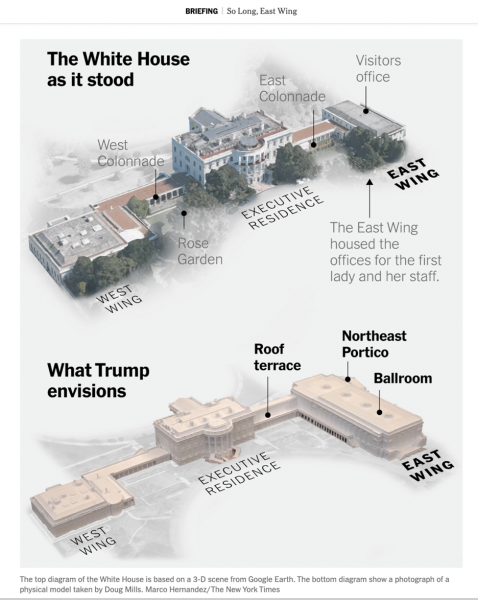
Luxuriating in his own narcissism, Trump ordered the clandestine demolition of the East Wing on Oct. 23 to make way for his 90,000 square foot ballroom. He apparently didn’t care about the national shock at the brutal amputation of America’s beloved cultural arm that balanced the hard political arm of the People’s House.
“This isn’t a real estate deal. This is a living, breathing building. It actually hurts, as a citizen. It’s us. It’s our home. This doesn’t belong to anybody except the blood, the sweat and the tears of every president,” new D.C. resident Roseanne Siegel told NPR.
“For historians and for Americans who love their history, this is a big blow,” said ABC News presidential historian Mark Updegrove.
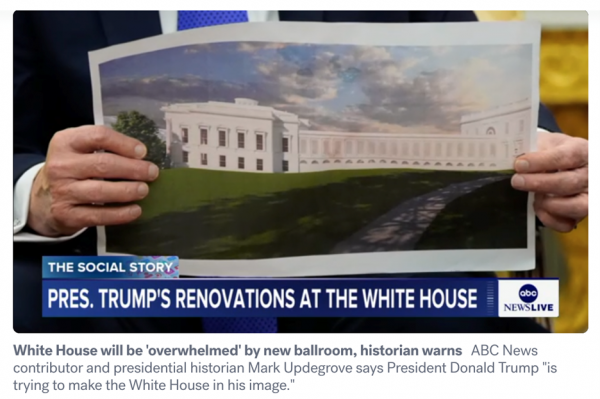
According to an Oct. 30 poll from the Washington Post, ABC News, and Ipsos, 56 percent of respondents disagreed with Trump’s move while 28 percent favored it. An earlier Yahoo/YouGov poll found 61 percent of respondents rejected Trump’s ballroom plan while 25 percent supported it.
Trump lied. “It won’t interfere with the current building,” Trump said last July about his ballroom plans. “It will be near it, but not touching it. And pays total respect to the existing building, which I’m the biggest fan of. It’s my favorite He was dishonest about his intent in terms of we’re not going to touch anything, like it’s going to be close, but not touching,” Kevin Wade, a 52-year-old tech tourist from Texas, told Reuters. “And then now we’re completely demolishing it.”
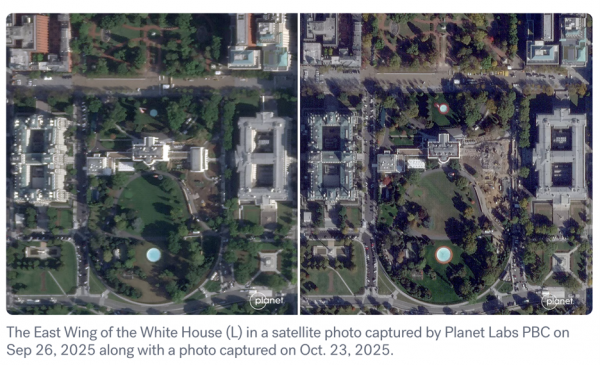
The East Wing emptiness is now a tourist attraction, a PTSD imprint that — with the rapid developments leading up to Thanksgiving — may inspire a turning point in Trump’s presidency.
On Tuesday, Nov. 18, after a 43-day government shutdown to avoid this moment, the U.S. House of Representatives voted 471-1 to compel the Justice Department to release all files on convicted child sex offender Jeffrey Epstein.
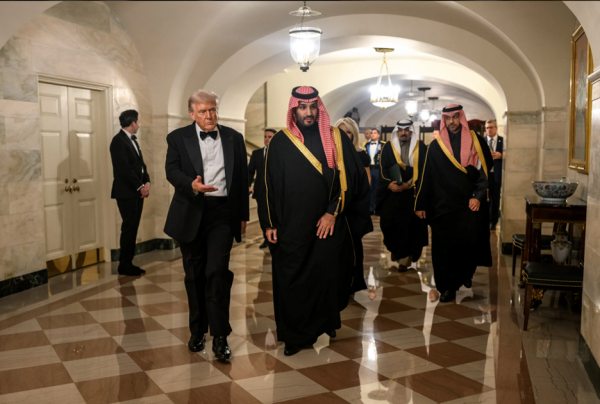
Meanwhile at the White House, Trump gleefully hosted Saudi Arabia Crown Prince Mohammed bin Salman, who US intelligence believes approved the gruesome 2018 murder of Washington Post columnist Jamal Khashoggi. The president scolded ABC News journalist Mary Bruce for embarrassing “guest” MBS with “a horrible, insubordinate” question about Khashoggi’s murder. “Whether you like [Khashoggi] or didn’t like him, things happen.”
In Bob Woodward’s 2020 book, “Rage,” Trump reportedly bragged about shielding MBS: “I saved his ass,” getting Congress “to leave him alone.”
Meanwhile, after the House vote, Epstein survivors huddled at a news conference, holding up photos of themselves as teenagers and young women, asking if Trump is innocent, what is he hiding? Why won’t he release the files now? Suddenly, thrilled survivors learned that the U.S. Senate had unanimously passed the Epstein Files Transparency Act and sent it to Trump for his signature.
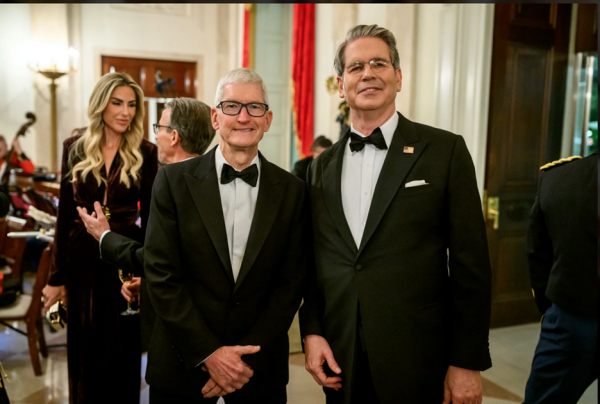
Cut to Trump hosting a black-tie dinner for MBS with lots of rich men who do business with the Saudis. The next morning, he announced that he had signed the Epstein bill, with a 30-day deadline.
“It was a remarkable turn of events for what was once a far-fetched effort,” AP reported. “Trump did a sharp U-turn on the files once it became clear that congressional action was inevitable.”
Trump needed a distraction.
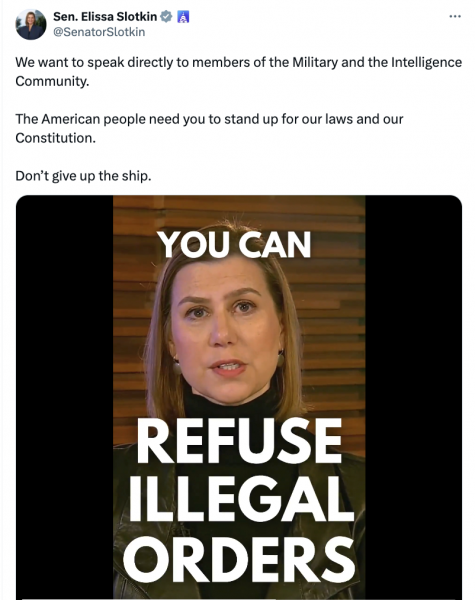
Early Tuesday morning, Nov. 18, U.S. Sen. Elissa Slotkin (D-Mich.) posted a 90-second video on her X account calling on U.S. servicemembers to not obey unlawful orders.
“The American people need you to stand up for our laws and our Constitution,” said Slotkin with five other fellow military veterans — U.S. Sen. Mark Kelly (D-Ariz.), and U.S. Reps. Jason Crow (D-Colo.), Chris Deluzio (D-Pa.), Maggie Goodlander (D-N.H.), and Chrissy Houlahan (D-Pa.). “Don’t give up the ship.”
The Uniform Code of Military Justice says troops who disobey a direct order will be punished. But servicemembers and officers also have an obligation to reject any order they deem is unlawful, a reference to the “I was only following orders” Nazi defense during the Nuremberg trials.
There is cause for concern. In his first term, Trump asked about shooting unarmed civilians protesting the murder of George Floyd. In his second term, Trump has threatened to use the Insurrection Act to deploy troops, “unleashed” police, federalized National Guard, and masked and violent ICE and Border Patrol agents in American cities.
“The president was enraged,” Trump’s 1st term Defense Secretary Mark Esper told NPR. “We reached that point in the conversation where he looked frankly at [Joint Chiefs of Staff] Gen. [Mark] Milley and said, ‘Can’t you just shoot them, just shoot them in the legs or something?’ … It was a suggestion and a formal question. And we were just all taken aback at that moment as this issue just hung very heavily in the air.”
Trump found his distraction on Thursday, Nov. 20, reposting a Washington Examiner story about the Democratic lawmakers’ video, adding that it was “really bad, and Dangerous to our Country. Their words cannot be allowed to stand. SEDITIOUS BEHAVIOR FROM TRAITORS!!! LOCK THEM UP???” In another post he said it was “SEDITIOUS BEHAVIOR, punishable by DEATH.”
Trump also reposted a @P78 comment: “HANG THEM GEORGE WASHINGTON WOULD !!” Bomb and death threats against the Democratic vets “surged.” Senate Democratic Leader Chuck Schumer said Trump was ‘lighting a match in a country soaked with political gasoline.’”
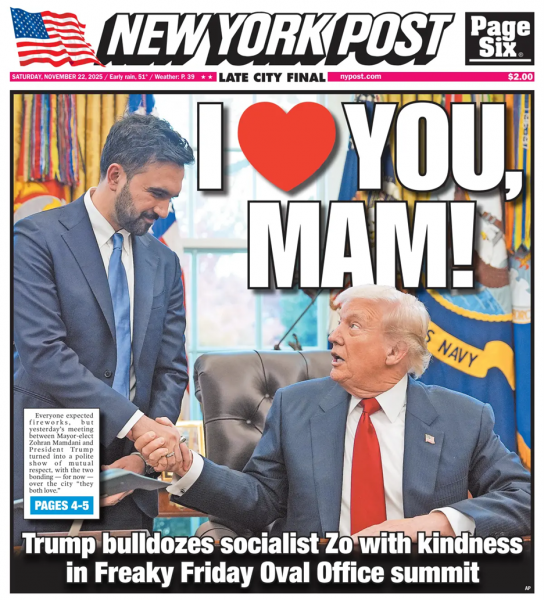
Cut to Friday. 34-year-old New York City Mayor-elect Zohran Mamdani met with Trump, who had vilified the Democratic Socialist. But inexplicably, the meeting turned into an Oval Office lovefest, with an almost giddy Trump, 79, saying it was “OK” that Mamdani had called him a fascist. He promised to help the city.
That night, longtime Trump and MAGA loyalist U.S. Rep. Marjorie Taylor Greene (R-Ga.) announced she’s resigning from Congress, effective Jan. 5, 2026.
Greene criticized Trump over “America First” and health insurance policies but a major split occurred when she sided with Epstein survivors over him. Trump called her a “traitor” and vowed to back a primary challenger.
“Loyalty should be a two-way street,” Greene said in her 10-minute video. “I refuse to be a battered wife hoping it all goes away and gets better.”
No one knows what’s coming next.
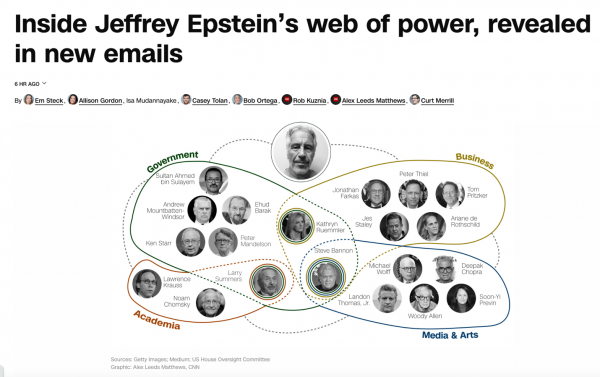
But for the LGBTQ community, there are other important split screens amid Project 2025 erasure – such as U.S. Rep. Robert Garcia (D-Calif.)’s key role as ranking member of the House Oversight Committee focused on transparency and justice for Epstein survivors.
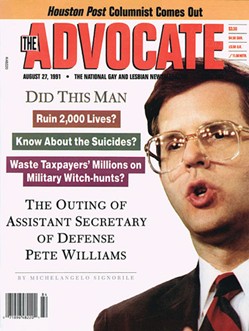
And while Trump was threatening Democratic lawmakers with death on Thursday, Pete Williams, a former NBC News correspondent and press secretary for Vice President Dick Cheney, spoke at Cheney’s funeral at the National Cathedral. Williams told the mostly old-fashioned Republicans how he offered to resign in 1991 when the Advocate was about to out him as gay. Cheney — who loved his semi-out lesbian daughter Mary — said no and checked on him after the story was published. During the horrific AIDS crisis in the early 1990s, ANGLE (Access Now for Lesbian and Gay Equality) fundraised and worked to elect pro-gay politicians. In 1991, longtime gay politico David Mixner introduced ANGLE to his friend, Arkansas Gov. Bill Clinton, whom the group helped elect as president.
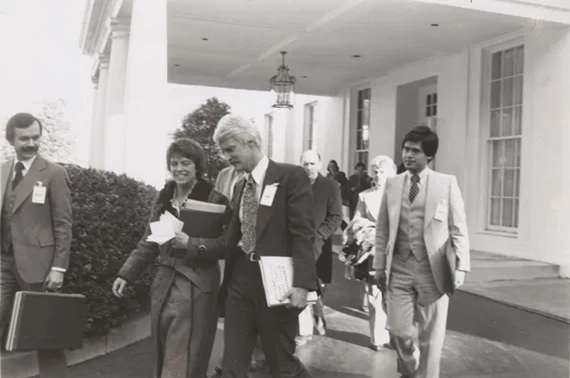
Gay people were not welcome at the White House until Clinton, other than one historic visit on March 26, 1977. Decades later, when ANGLE’s Jeremy Bernard was being interviewed by first lady Michelle Obama for the job of Social Secretary, he recalled how difficult it was to get through the East Wing visitors’ entrance during Clinton’s administration.
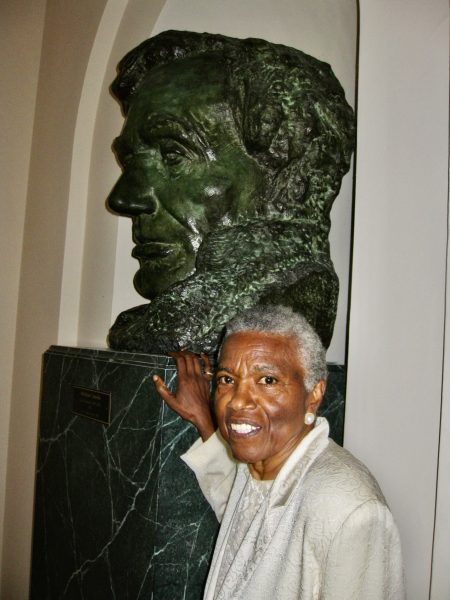
“I said to Mrs. Obama, ‘It takes a lot to get in these doors. And I think it’s very important for people to feel very welcomed,’” Jeremy says during a recent conversation.
The first lady agreed and “wanted to make sure as many people that never had been to the White House and never thought they would be, got the experience to do it.”
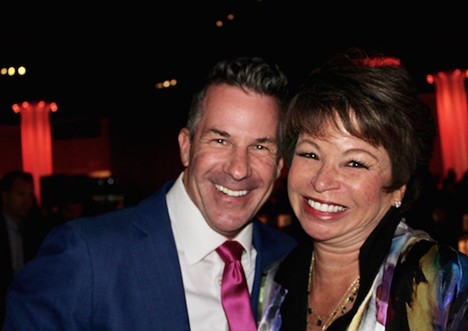
Bernard worked for Obama’s presidential campaign in 2008, then as White House Liaison to the National Endowment for the Humanities before serving as Senior Advisor to the US Ambassador to France. On Feb. 25, 2011, he became the first male and first openly gay person to serve as Social Secretary.
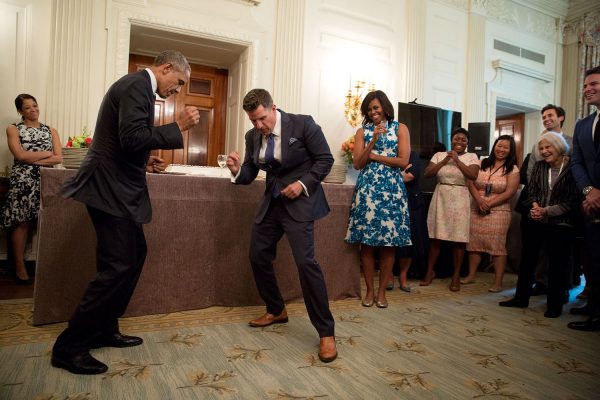
“Jeremy shares our vision for the White House as the People’s House, one that celebrates our history and culture in dynamic and inclusive ways. We look forward to Jeremy continuing to showcase America’s arts and culture to our nation and the world through the many events at the White House,” Obama said in a press release.
“My office was in the East Wing, and I had what I thought was the best office. I looked over toward the South Lawn, but I also had the roof of the East Colonnade below me. I had a window that actually would open like a door, and you could walk out onto the roof as if it was a patio,” Bernard recalls, noting that he was warned to call the Secret Service before going out to avoid getting shot.
“I was so shocked,” Bernard says about the East Wing being demolished. “When I first heard there were bulldozers, I was like, well, what is it they’re knocking down from it?” — finding out later, “the whole thing” was gone.
He felt “some self-sorrow” and “numb” remembering his office. “It really is a part of history, not just for those of us that worked there, but for virtually everyone – whether you were there for a state dinner, a holiday party, or a reception for St. Patrick’s Day, LGBT celebration — whatever it was, everyone came through the East Wing.”
California Gov. Gavin Newsom said it well, Bernard says. “Compared to what ICE is doing and all that, it may not rank up there, but it’s symbolic of what’s happened in our country.”
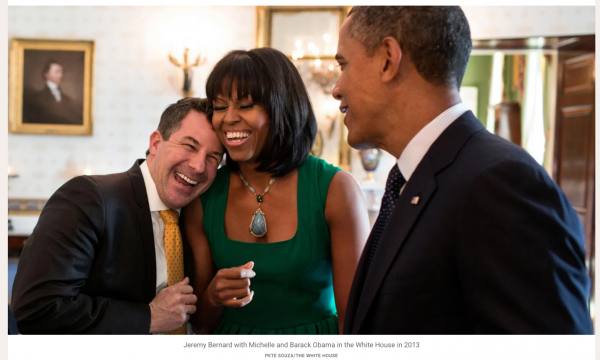
Michelle Obama said it well, too. “We always felt it was the people’s house,” she told CBS “The Late Show” host Stephen Colbert. “I am confused by what are our norms? What are our standards? What are our traditions? I just feel like, what is important to us as a nation anymore? Because I’m lost.”
And, Michelle Obama continued, “I hope that more Americans feel lost in a way that they want to be found again, because it’s up to us to find what we’re losing.”
“The West Wing was work — sometimes it was sadness, it was problems. It was the guts of the White House,” she said. “The East Wing was where you felt light.”
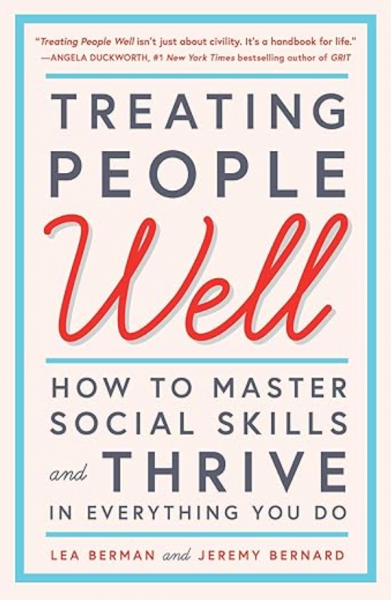
Bernard and Lea Berman, social secretary in the George W. Bush White House, have some suggestions in their book “Treating People Well,” subtitled “How to Master Social Skills and Thrive in Everything You Do.”
“It was important to us to see that despite our differences in how we viewed policy, Lea and I and Lea’s husband — who is an operative in the Republican Party — were very close,” Bernard says.
“I think about what this must be like for kids,” Bernard says. “We always looked at these presidents as a certain type of person.”
But now people hear Trump say, “’I hate my enemies. I want revenge.’ What is that teaching kids?” Bernard asks. “The president of the United States is saying that. I think it’s really frightening. We can’t let that stand.”
“I think we’ve got to go back to the way we were brought up about how you treat other people,” Bernard says. “It’s really important that we focus on the more positive characteristics of human beings … Most communities are very different and we celebrate that. But you can only celebrate it with civility.”
Karen Ocamb is a veteran LGBTQ journalist and former news editor for the Los Angeles Blade. This article was originally posted on her Substack LGBTQ+ Freedom Fighters. Her extended conversation with Jeremy Bernard, who talks more about the East Wing, ANGLE and the Obamas, is embedded in the post.
National
Study shows ‘pervasive mistreatment of LGBTQ people by law enforcement’
Findings claim nationwide police misconduct, including in D.C., Va., Md.

The LGBTQ supportive Williams Institute, an arm of the University of California at Los Angeles School of Law, released a report last month citing multiple research studies conducted over the past 25 years showing past and “ongoing” mistreatment of LGBTQ people by law enforcement throughout the United States.
“Findings show that LGBTQ communities – particularly LGBTQ people of color, youth, and transgender and gender nonconforming individuals – have faced profiling, entrapment, discrimination, harassment, and violence from law enforcement for decades, and this mistreatment continues to be widespread,” according to a Williams Institute statement.
“Experiences of police mistreatment may discourage LGBTQ people from reporting crimes or engaging with law enforcement,” Joshua Arrayales, the report’s lead author and Williams Institute Law Fellow said in the statement.
“Reporting crimes is essential for accurate crime statistics, proper allocation of crime prevention resources, and support services that address the unique needs of LGBTQ survivors,” he said.
The 59-page report cites the findings of two dozen or more studies and surveys of LGBTQ people’s interaction with police and law agencies for the past 25 years through 2024 conducted by various organizations, including the ACLU, the National Coalition of Anti-Violence Programs, the Williams Institute, and local government agencies.
But the report does not provide a breakdown of where police abuse against LGBTQ people occurred by specific police departments or locations. Instead it provides survey research findings of large groups of LGBTQ people who responded to a survey in different locations of the U.S.
Among other things, those surveys have found “LGBTQ people are more likely than non-LGBTQ people to report being stopped by police, searched by police, arrested, and falsely accused of an offense,” the Williams Institute statement accompanying the report says. “LGBTQ people also report substantial rates of verbal harassment, physical harassment, sexual harassment, and assault,” it says.
The report itself cites surveys of LGBTQ people’s interactions with police in D.C., Baltimore, and Virginia but does not give specific cases or identify specific police departments or agencies.
“A 2022 study based on interviews with 19 Black transgender women from Baltimore and Washington, D.C. identified a theme of re-victimization while seeking help from police,” the report says. “One participant noted that male officers asked what she did to cause her own abuse,” according to the report.
“Other participants expressed that when a knowledgeable officer was present, such as an LGBTQ+ liaison, they felt more inclined to reach out for help,” it says.
The report also states, “A 2024 study based on interviews with 44 transgender people in Virginia documented two instances of transgender women being pulled over for broken tail lights and then being mistreated once officers discovered they were transgender based on their IDs.” The report does not reveal the specific location in Virginia where this took place.
Other locations the report cites data on anti-LGBTQ conduct by police include New York City, Chicago, Los Angeles, Palo Alto, Newark, N.J., and Austin and San Antonio in Texas.
The full report can be accessed at williamsinstitute.law.ucla.edu.
-

 LGBTQ Non-Profit Organizations5 days ago
LGBTQ Non-Profit Organizations5 days agoVictory Institute honors President Biden
-

 Research/Study4 days ago
Research/Study4 days agoHRC study reveals GOP efforts to undermine LGBTQ rights and services in 2026
-

 National4 days ago
National4 days agoStudy shows ‘pervasive mistreatment of LGBTQ people by law enforcement’
-

 a&e features4 days ago
a&e features4 days agoUltimate guide to queer gift giving

